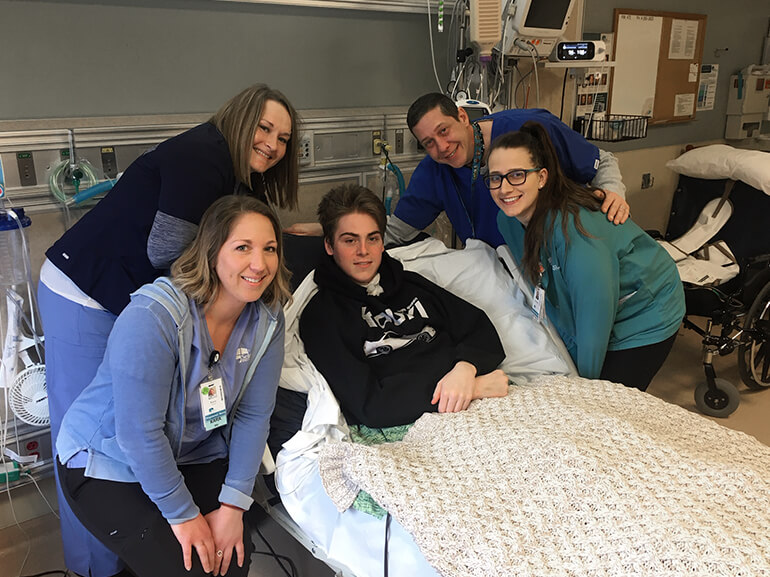Sam's Story

Saving Sam
Sam Powell was looking forward to taking a break. The holidays were coming and the 20-year-old was ready to step away from his aviation maintenance coursework to enjoy time with family and friends.
As Thanksgiving approached, Sam didn’t feel well. Plagued by body aches, congestion and nausea, he knew something was “off.” One day after the holiday, he remained in his room. His mom checked in and found him unconscious, unable to move and barely breathing.
She dialed 911, paramedics arrived, assessed and placed him on a breathing tube. His temperature spiked to 105. Doctors at the local hospital quickly determined Sam needed more help. He was placed on a ventilator and transferred to a regional medical center. Three days later, Sam was air-lifted to the neuro-intensive care unit of the Mayo Clinic in Rochester, Minnesota.
Extensive testing revealed Sam had rhombencephalitis – a brain stem infection – and encephalomyelitis – an inflammation of the brain and spinal cord. The infection caused his paralysis.
In the weeks leading to Christmas, Sam struggled to survive, but finally stabilized – a holiday miracle to his family. His parents, Mary and David, wanted Sam closer to home and transferred him to Select Specialty Hospital – Madison where Sam could receive specialized therapeutic and respiratory care and additional recovery time.
His parents' top goals were to get Sam breathing and moving independently. Ultimately, they hoped he’d return to the things he loved – school, hanging out with his friends, working on his car, skiing and snowboarding.
A physician-led team of nurses, therapists and dietitians created a plan to help get him there.
Sam arrived Christmas Eve, unable to breathe, eat, speak or move. He was able to follow commands just 10 percent of the time. He could blink to answer yes/no questions and smiled frequently in response to familiar faces.
The holiday didn’t stop the team from putting his treatment plan into action. Doctors and respiratory therapists evaluated Sam’s readiness to begin breathing on his own.
Therapists monitored bursts of time off the breathing machine, helping Sam’s lungs do more of the work.
Physical and occupational therapists started our mobility program. They moved his arms, legs, wrists and ankles, helped him roll and attempt to sit up.
After a week, Sam was following commands most of the time and had reported feeling more control of his head and neck.
He also had some arm movement.
Speech and respiratory helped fit Sam’s airway support with a speaking valve, which brought more air into his lungs and allowed him to express himself.
He did well with the valve and quickly progressed to breathing independently.
Speech therapists also stepped him through mouth and throat exercises. This would help him avoid sucking food or liquid back into his lungs, a pneumonia risk.
Nurses kept Sam comfortable, turned him and monitored his skin for signs of breakdown.
Physical and occupational therapists pushed him each day. His mom and dad, who took turns staying by his bedside, encouraged him. Each day, there were glimmers of progress, signals that Sam was beginning to heal.
Using a special table that supported him, Sam practiced standing. He started feeling his toes and ankles. Feeling better connected to himself, Sam was ready to try a wheelchair.
In three weeks, Sam could roll himself more than 100 feet down the hallway.
He continued working with speech therapists to strengthen his swallowing ability. As he prepared to leave, a second swallowing study revealed he was ready to return to regular meals and liquids.
Sam had one request -- sushi.
One of his therapists raced to the best sushi restaurant in town and delivered a selection of his favorites. Sam said he’d never had a better meal.
A month after arriving, Sam was ready to take the next step in his recovery journey. He headed to an inpatient rehabilitation hospital, where he continues rebuilding strength and stamina.
His studies are on hold while he focuses on recuperation, but he looks forward to picking up where he left off soon.